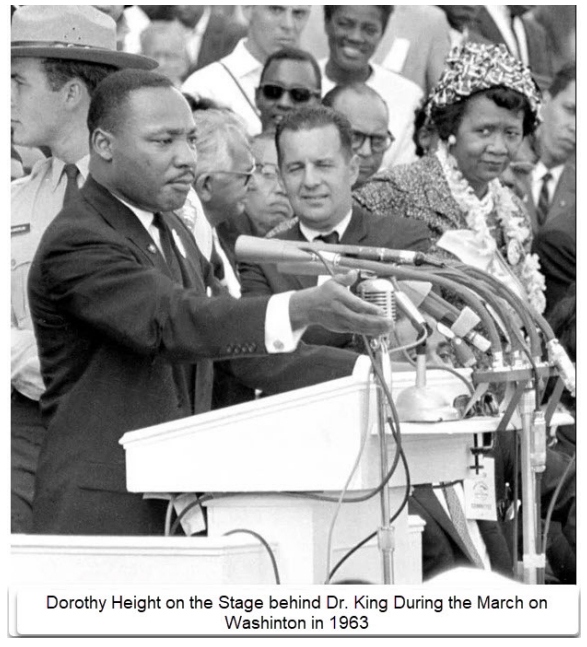Envy and Women of the Civil Rights Movement

Disclaimer: The views and opinions expressed in this article are those of the author and do not necessarily reflect the editors' views or any agency, organization, or employer. Based on my experience, research, and knowledge, my statements are in good faith and are only for informational purposes. Please research and follow up on all claims for yourself.
Have you ever been jealous or envious? I have, and it happens more than I want to admit. So, it's something that I'm constantly working on, and I'm getting better. I have also been the victim of jealousy and envy, and when this happens, I step back or shy away from my productivity and accomplishments because who wants to be the source of discontent? Regardless of whether I feel jealous or someone feels threatened by me, it's likely to stunt my growth and prevent me from being and doing all that I can do. In fact, there have been times when I wanted to step up and do something but didn't because I was worried about what others would think. I am hoping that by sharing and being both a mentee and a mentor, I can work through these issues.
This week, I thought about the women of the civil rights movement and their ability to work together and seemingly avoid jealousy despite facing tremendous competition, adversity, and opposition. I also wonder if they struggled with thoughts of inadequacy as they preserved and interacted with others. They were all so talented and often had to make some serious personal sacrifices for the betterment of everyone. Historically women also had to embrace the talent and voices of men while silencing their own voices and occupying roles behind the scenes as the men became the face of the movement. Still today, women activists of the Civil Rights Movement don't get their due. So as part of my therapy, I want to shine the light on the contributions of some of the women in the Civil Rights Movement and demonstrate how their collective efforts benefit all of us.Dorothy Height and Mary McLeod Bethune
Dorothy Height (1912-2010) was a prominent civil rights activist and leader who fought for equal rights for African Americans and women. She was a scholar and a great speaker. She was actively involved in many organizations, including the United Christian Youth Movement, the Young Women's Christian Association (YWCA), and the National Council of Negro Women (NCNW), which Height led as president for 40 years. She met Mary McLeod Bethune in 1937 while escorting Eleanor Roosevelt to the National Council of Negro Women (NCNW) meeting.
Bethune (1875-1955) was an educator who established a school for African American girls in 1904. The Daytona Literary and Industrial Training Institute for Negro Girls later became Bethune-Cookman College, where Bethune was the first African American woman college president. She also founded the National Council of Negro Women (NCNW) and worked as a special advisor to several U.S. presidents, including Franklin D. Roosevelt and Harry S. Truman.
Bethune mentored Height and played a crucial role in shaping her career. They worked together on various social programs to improve the lives of African Americans and women. Dorothy Height was a part of the planning for the March on Washington and she offered the NCNW headquarters as a meeting place, despite not being allowed to speak at the event. After the event, Height scheduled an "After the March, What?" debriefing to address the treatment of women in the movement. In 1966, Height served on the White House Council on Civil Rights.Ella Baker and Fannie Lou Hamer
Ella Baker and Fannie Lou Hamer worked together and significantly contributed to the civil rights movement. They came from different backgrounds, but they shared a commitment to empowering ordinary people and promoting grassroots activism. Ella Baker (1903-1986) is known as "the greatest organizer the civil rights movement ever knew," she worked closely with the Southern Christian Leadership Conference (SCLC), Martin Luther King Jr, John Lewis, and others. She was the force behind the Student Nonviolent Coordinating Committee (SNCC) and other organizations, she made sure people were where they supposed to be when they we supposed to be there. Through her activism and leadership for SNCC, Baker met Fannie Lou Hamer. Hamer (1917-1977) was a sharecropper and civil rights activist who worked with SNCC in Mississippi. She was known for powerful speeches and her ability to inspire people to act. Hamer advocated for voting rights, and she played a vital role in the Mississippi Freedom Democratic Party. In 1964 she challenged the Democratic National Convention because of their all-white delegation from Mississippi. Baker mentored Hamer, helping her to develop her skills as an organizer and speaker.
These women recognized the importance of solidarity and collaboration and supported each other and their male counterparts in their efforts to challenge discrimination and social injustice. I'm sure jealousy and other emotions would arise, but they found common ground and worked toward the greater good. Regardless of their struggles, they advocated for a more inclusive and equitable society for everyone, as will I and I hope you will too.
References:
Dorothy Height -- https://www.nps.gov/mamc/learn/historyculture/dorothy-irene-height.htm
Ella Baker-- https://kinginstitute.stanford.edu/encyclopedia/baker-ella-josephine
Fannie Lou Hamer -- https://kinginstitute.stanford.edu/encyclopedia/hamer-fannie-louMary
McLeod Bethune -- https://www.nps.gov/mamc/learn/historyculture/marymcleod-bethune.htm
Voices of Democracy: Women Leaders of the Civil Rights -- https://edsitement.neh.gov/media-resources/voices-democracy-women-leaders-civilrights-struggle
Sophia Brewer (M.L.I.S.) is Collection Development and Serials Librarian, Grand Rapids Community College; Co-President of the Greater Grand Rapids History Council; member of the Grand Rapids Study Club and serves on the Grand Rapids Public Library, Board of Library Commissioners (Elected 2016-2021). She is a former Head of Programs, Grand Rapids Public Library and former Branch Manager, Madison Square Branch, Grand Rapids Public Library Congresswoman

Tagged in: